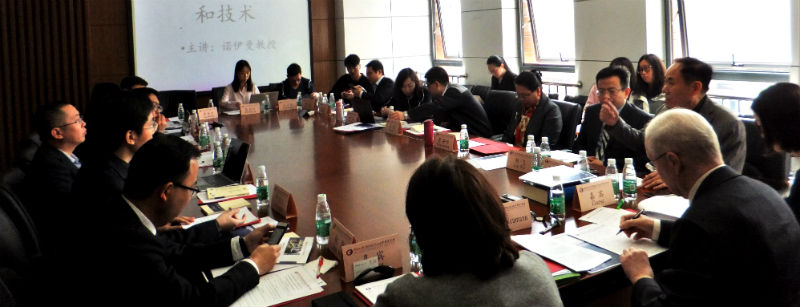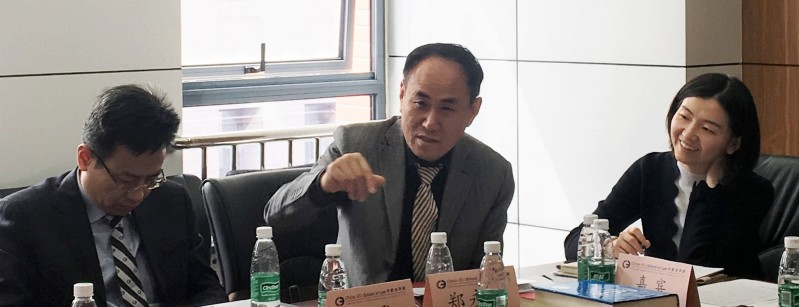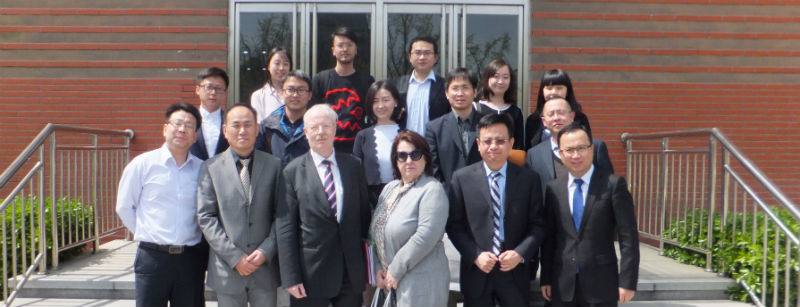On 12 April, a symposium on the “Concept and Technology of legal commentary” was held by the China-EU School of Law (CESL) at the China University of Political Science and Law. The former president of the International Association for the Philosophy of Law and Social Philosophy (IVR) and professor of Criminal Law, Criminal Procedure Law, Legal Philosophy and Legal Sociology at the University of Frankfurt, Prof. Neumann, was the keynote speaker. Prof. Zheng Yongliu from CESL hosted the symposium. Amongst the scholars attending were: Prof. Lin Wei, the vice-principal of the University of Chinese Academy of Social Sciences, Prof. He Qingren and Dr Cheng Jie from the School of Law of the University of Chinese Academy of Social Sciences, Zheng Yu shuang from the School of Law of the Central University of Finance and Economics, Prof. Fei Anling, the dean of the School of Juris Master of the China University of Political Science and Law, Prof. Wang Zhiyuan and Dr Geng Jianing from the Criminal Justice College of China University of Political Science and Law, Wang Qiang, from the School of Foreign Languages of the China University of Political Science and Law, Dr Jin Jing from the Civil, Commercial and Economic Law School of the China University of Political Science, Prof. Liu Fei, the Chinese Co-Dean of CESL and Dr Zhao Tianshu. There were also many PhD students from Peking University, Beijing Normal University and the China University of Political Science and Law.

Practice-oriented Philosophy of Law
Prof. Neumann is renowned in the field of philosophy of law. He is co-editor of the 8,000-pages commentary on Criminal law published by the German publishing house Nomos.Prof. Zheng Yongliu introduced to Prof. Neumann’s approach to the philosophy of law and stressed the practice orientation of his work.

After brief introduction of the host, Prof. Neumann started his report. As he said, German legal culture cannot be separated from legal commentary that is of great importance to legal education, legal research and judicial practice. As for law practitioners in Germany, it is impossible to imagine a legal world without legal commentary. What’s the mission of legal commentary in a legal system? What problems are there inlegal commentary?

The Mission ofLegal commentary
Legal commentary examines law article by article, provides explanation for connotation of each legal norm, reveals the legislation objectives borne by the norm and simplifies the applicability of specific articles, which are the core missions of legal commentary, Prof. Neumann explained.
In Germany, academic papers must refer to legal commentary. On the one hand, legal commentary explains the so-far legal norms and judicial precedent. On the other hand, professors who edit legal commentary interpret and evaluate legal commentary in academic research, which means that explanation is further explained. Legal commentary acts as the bridge of the benign circulation. Legal commentary is also the expression of the scholars’ perspectives, through which we can not only find out the different views of different legal commentary on the same problem but also notice that there are objections against the judicial precedents confirmed by courts under some circumstances.
Regulative Significance and Criticism of Legal commentary
Legal commentary is written and edited by scholars without legislation rights or judges with jurisdiction in the identity of scholars so itits no institutional authority.How is it nevertheless significant? In the field of law in Germany, there exists the culture of mutual concern, dialogue and understanding between legal scholars and practitioners. Legal commentary provides instruction of regulative connotation for judges. This way, legal commentary plays its role of regulative significance, which benefits from the tradition started by Romans, explaining and reforming Roman law is the mission of legal academy, even being discounted in the modern and contemporary law culture. Definitely, there are differences in influence and regulative significance of different law commentaries, which depend on their “quality” and “quantity”. Quality refers to the legal commentary itself including the authors’ academic reputation and accomplishments. Quantity refers to the external supporting voice. It is worth mentioning that “general opinion” is a powerful way of argumentation in the legal circle.
In conclusion, legal commentary is of regulative significance in Germany and also suffers from resulting criticism. Firstly, editing legal commentary interferes with the state monopoly on legislation rights. Secondly and contrarily, editors may lack objectivity and neutrality and accept law-makers’ decisions without judgment. Prof. Neumann responded to both, respectively.
Firstly, judges sometimes make judgments based on suggestions from legal commentary but judges act as the subject of judicial power and the decision rights completely lie in the court. Law-makers can correct the precedents through legislation behaviors at any time so the statement that legal commentary interferes with the state legislation rights is not convincing, Neumann said.
Secondly, commentary editors must be established in the order of existing laws principally, which does not mean that they must accept the specific law contents without judgement. Establishing in the order of existing laws refers to the convergence in the overall sense and does not exclude the judgments on a piece of specific law. Objectivity and neutrality do not refer to themselves. Legal commentary editors, as judges, must be influenced by previous judgments inevitably. It refers to a kind of “desire” or the moral character that explains the truth to a high standard and expresses editors’ knowledge and ability, through which the second criticism is turned down.
Between Legal Research and Practice
Legal commentary is the product of legal research instead of law practice. What’s the rationality in this? This question targets the overall relationship between legal research and practice. Practice is related to judging cases while research refers to the institutional construction of legal principles and places itself in the correlation with history and regulations. Firstly, such structural function differences should be admitted while there is even the consistency of the task stead of conflicts. Through the dogmatic way, the written laws are specified and become the reasons for people’s behaviors. Both academic activities and law practice are promoting the development of dogma.
Furthermore, both research and practice are the components of the social legal system in the broad sense and shoulder the mission of constructing the social order. Since then, it cannot be better if cooperation can be achieved in an appropriate way between the two.
Dialogue
When Prof. Neumann’s report ended, the dialogue began. Prof. Lin Wei stated that he basically agrees with Neumann’s opinions and pointed out that it is necessary to refer to experience of German legal commentary to build the bridge to judicial practice and academia in China. He believed that there still remain problems like slow updating of knowledge and refusal to learning the newest theories in the judicial practice in China now. Additionally, he pointed out that law schools at Chinese universities also fail to develop students’ law explaining ability well. The majority of students read teaching materials only, regardless of the great thinking methods and explaining techniques, so they are weak in practice frequently.
Prof. Fei Anling, starting from the field of civil law, demonstrated the importance of legal commentary on legislation activities. Prof. Fei, with great interests in the neutrality of commentary described byProf. Neumann, asked how German scholars maintained their objective and neutral position in editing the commentary.
Prof. Liu Fei delivered a review from the perspective of an administrative law scholar. He argued that in the field of administrative law in China, the academic circle attaches high importance to court trials and scholars frequently know much about practice. However, he believes that it is quite hard to introduce the translation of German legal commentary in China, which requires translators to be quite familiar with the views of each academic school in Germany on each issue, including the views of the minority. Therefore, if the translation of German legal commentary is introduced, it is hard to realize the correctness and give full play to its effects. Finally, on the judicial letters that interpret the constraint law mentioned in Prof. Neumann’s report, he further questioned under what circumstance German judges have the responsibility to interpret according to such judicial letters.
Prof. He Qingren introduced his experience of organizing and editing Chineselegal commentary in recent years. He mentioned that thereare three conditions. The first one is the interaction relationship between academia and practice. The second one is the great judicial precedent system. The third one is scholar’s concern for research on judgment. He concluded that thelegal commentary in China is at the beginning and that he hopedthatProf. Neumann can introduce the historical developing process of Germanlegal commentary for reference.
Prof. Wang Zhiyuan also spoke about the editing of legal commentary for Chinese criminal law. He edited two volumes and more than 3,000 pages, which was just modified in the last year. However, he believes that this work cannot exert great effects on grass-roots courts’ trial activities. He pointed out that there generally exists the phenomenon that judges have inconsistent positions on similar cases in the practice circle and believed that the crux is that there fails to develop the law tradition of simultaneous development of theory and judicial practice like Europe in China.
Subsequently, Prof. Neumann answered to the opinions and questions of these professors. He said that hel earned about a number of current cases in China and he appreciated that he had benefited much from opinions of the attending guests. Prof. Neumann agreed with Prof. Lin Wei’s opinions that there are too many cases to be processed so it is impossible to hand over all the disputes to the Supreme Court. There are also problemsas there are different judgments on the same case. As for such problems, Neumann believes that courts may make different judgments basingon different opinions. However, generally speaking, German judges are the judges under academic influence. Likewise, opinions of practitioners play a guiding role for scholars. Targeting at the neutrality problem proposed by Prof. Fei Anling, he believes that it may remain a difficulty in all the legal culture. In Germany, the neutrality standpoint is not achieved overnight. There are always various differences in academic views and a relatively general view can form in the future discussion. Generally speaking, legal commentary may not be neutral. However, through reflection, scholars will re-position the neutrality. Another guarantee for neutrality is the input of views of the minority whose response is of great importance to development oflegal commentary. Aiming at the proposal ofProf. Liu Fei, he added to the previous statements and pointed out that judicial letters that interpret constraint laws are a form existing in democratic Germany, not in the current practice.
Targeting at Prof. He Qingren’s question on editing experiences, Prof. Neumann pointed out that the editing oflegal commentary needs to be determined according to the difficulty of specific terms, and sometimes even requires the joint editing of a number of scholars. In editing specific terms, it is necessary to edit if the audience is in the practice circle or the academic circle. Finally, it is worth noticing that it is not feasible to edit too much in the professional field to form academic autobiographies. Eventually, he concluded on Prof. Wang Zhiyuan’s speech again that the differences in the relationship between judicial practice and academic circle displayed by legal commentary result from cultural and political institutions. He proposed that, under such circumstances, if Chinese scholars insisted on editing the legal commentary in scale and providing reference and help for judges’ trial, which may gradually influence judges’ trial and form the benign dialogue between academic circle and judicial practice. After one round of comment, proposal and response, Dr Geng Jianing, Dr Jin Jing, Dr Zhao Tianshu and other attending scholars proposed new opinions and participated in the discussion.

Author: Tan Weijie (Phd candidate at China-EU School of Law)
Translation: Li Lin
